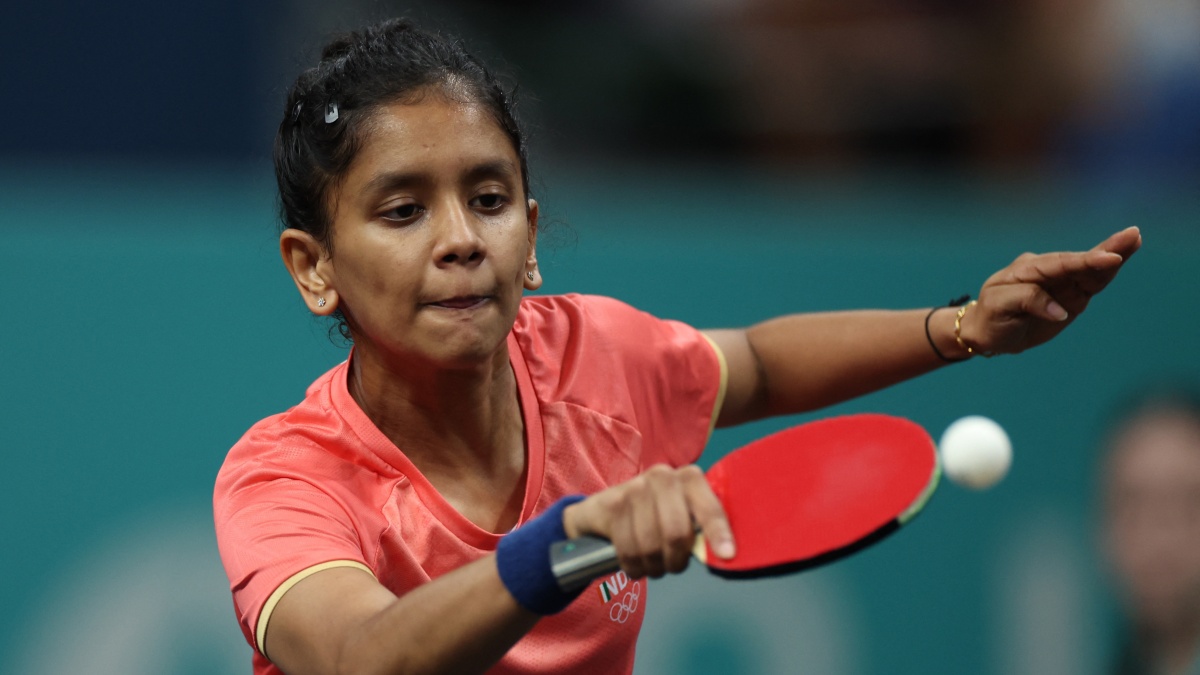Indian table tennis players’ historic run at the Paris Olympics ends with close defeats. Where did they lack? read more
)
Sreeja Akula went down to China's Yingsha Sun in the Round of 16 at the Paris Olympics. Reuters
Indian table tennis faced a poignant moment of “so close, yet so far” at the Paris 2024 Olympic Games, with Sreeja Akula and Manika Batra both falling in the Round of 16 in the Women’s Singles. Despite their narrow defeats, they achieved a historic milestone by becoming the first Indian paddlers to advance to the Round of 16 in the singles event, setting a new benchmark for the sport.
Earlier, in the Round of 32, Sreeja, celebrating her 26th birthday, overcame Singapore’s Zian Jeng 4-2 in a clash of contrasting styles. It was Sreeja’s speed pitted against Jeng’s power. Jeng, parking herself in the middle of the table, aimed to neutralise Sreeja’s quick footwork. She pinned Sreeja down to her backhand, varying the degree of topspin in her attacks and throwing the occasional backspin push into the mix.
These variations seemed to unsettle Sreeja, making her hesitant to deploy her pivot forehand topspin. However, with the match finely poised — Sreeja down a game and tied at 10-10 — she cleverly switched tactics. Jeng, who is at her powerful best when stationary, was made to move all around the table by Sreeja, resulting in a loss of power and accuracy in her shots.
This adjustment gave Sreeja the time and space needed to bring her quick, attacking shots into play. Every winner from Sreeja’s racket drew a roar of approval in the stands from her personal coach Somnath Ghosh, who is part of the Indian contingent. This clever change in gameplay was enough to secure the win and book an encounter with World No. 1 Sun Yingsha of China in the Round of 16.
— JioCinema (@JioCinema) July 31, 2024It was clear from the outset that Sreeja would need to deliver an exceptional performance to challenge Sun, the overwhelming favourite for the gold medal. And she certainly rose to the occasion, posing Sun her biggest challenge yet.
Sreeja faced an opponent of a similar style to her previous adversary, Zeng, but with much higher skill—powerful, fast, and highly accurate. The strategy was clear: use the ‘long pimple’ to deny Sun pace and height on the ball, and then exploit openings with quick forehand topspin shots.
Initially, Sreeja’s strategy proved effective, as she built leads of 10-6 in the first game and 10-5 in the second. However, Sun found an extra gear and won both games 12-10. Sreeja struggled to recover mentally from these narrow losses. Although the third and fourth games were closely contested, Sun ultimately took control and won 4-0, leaving Indian fans to reflect on what might have been.
While some might argue that Sreeja failed to capitalise on crucial moments, Sreeja did not do much wrong. It was Sun that produced exceptional table tennis. Despite this, Sreeja is likely to be her own harshest critic, having squandered 9 game points in total.
Sreeja struggled with her receiving game, consistently opting to receive serves with her backhand. She likely chose this approach because her ‘long-pimple’ backhand rubber negates the impact of an opponent’s spin, making it easier to handle spin-loaded serves. However, this made her predictable.
Sun began serving short and wide to Sreeja’s forehand, forcing her to move off position for the return. She then aggressively targeted Sreeja’s backhand, leaving her with little time to recover. As a result, Sreeja struggled to apply the usual control she achieves with her ‘long-pimple’ rubber, allowing Sun to assert her dominance in each rally. Ultimately, Sun’s power and manipulation of angles proved too much to handle.
Manika Batra lost 1-4 in the Round of 16 to Miu Hirano of Japan in yet another tantalisingly close fixture. Like her compatriot Sreeja, Manika, who played earlier in the evening, had plenty of opportunities for the taking which were not converted.
Hirano, a former Women’s World Cup winner, was completely untroubled by Manika’s ‘long-pimple’ backhand rubber. She served long and fast to Manika’s backhand, knowing that the return would be slow and floaty. She then capitalised on these weak receives to get her attack going from both flanks. Hirano, who hits a beautiful topspin stroke, used her full body to generate maximum spin and attach from both flanks.
Despite this onslaught, Manika exercised great control from the backhand side, keeping her defensive shots low and close to the net, forcing Hirano to play a defensive push in between her attacks. These breaks in attack gave Manika opportunities to bring in her own forehand into play, which she did on many successful occasions. Manika also used the ‘twiddle’ to great effect, using her fast forehand rubber from the backhand side to disrupt Hirano’s rhythm.
However, what troubled Manika the most was Hirano’s backhand topspin down the line. Typically, a backhand topspin hit down the line to a right-hander will spin inward after bouncing. However, Hirano, with her deft footwork, has the rare ability to make this shot spin either inward or outward. This variation created significant problems for Manika, as the ball repeatedly struck various parts of her racket but rarely made contact with the sweet spot on her forehand side.
With each game passing, Manika cut a frustrated figure. She glanced into the stands each time she missed a point, in search of a solution that was not forthcoming. As the match wore on, she sported a wry smile that encapsulated the match perfectly: a recognition of an opportunity that was there for the taking, but ultimately slipped away.
Nevertheless, both Indian women have made history and can hold their heads high after their performances in the singles event. The difference at this level was not in skill, but in the ability to adapt tactics quickly during the match. A key takeaway for both should be an affirmation that they belong among the world’s best, and can consistently deliver top-level performances. Both Sreeja and Manika will undoubtedly reflect on their performances and draw valuable lessons from them as they prepare to give their best in the Women’s Team Event.
(The author, a National Level table tennis player, has represented the state of Maharashtra across all age groups and at the senior level. He was the Under 12 Indian national champion and participated in international tournaments at the age-group level. Additionally, he is a silver medallist at the All-India University championships, representing the University of Mumbai.
He has completed a Masters in Sport Management from Loughborough University, and is currently working with the coach education team for British Rowing, the National Governing Body for rowing in England).

 1 month ago
83
1 month ago
83
)
)
)
)
)
)
)
)
)
)
)
)
)
)
)
)
)
)
)
)
)
)
)
)
)
 English (US) ·
English (US) ·